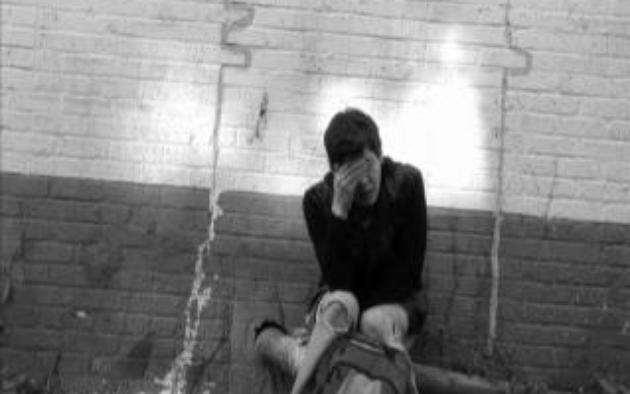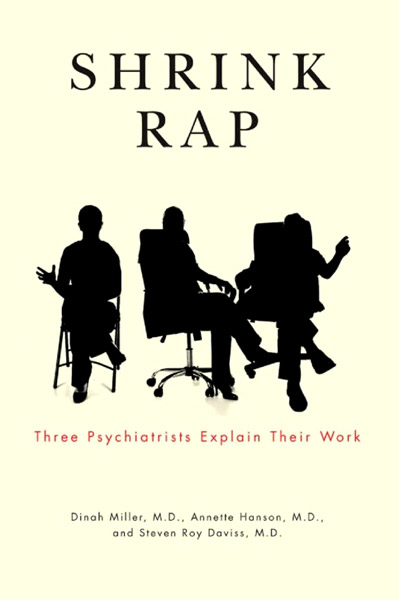
On Monday, I published a plea from parents whose son doesn’t think he is sick or needs help. Today, Dr. Dinah Miller, a Baltimore psychiatrist, author and popular mental health blogger, offers her advice to the same concerned parents.
Dear Pete,
We have tried to get our son professional help. I think he has bipolar disorder, although he possibly could have schizophrenia. We know he has an alcohol addiction. He has not cooperated with hardly anything, and we’ve been unable to get him to go to our local mental health center, although officials there said he is eligible for treatment.
We feel like our hands our tied. The few times that we’ve gotten him to a psychiatrist, our son denies that he is sick, won’t take his medicine, and is extremely hostile to doctors for the short time he’s being seen by them. We’ve had him in our house for several months with his erratic moods and high level of anger. Yesterday he asked to go to a homeless shelter and he is now on the streets. If we try to visit him, he runs away.
His dad and I are at the point where we feel resigned that there is no hope nor help for our son. The system has worked against us at every turn … and he needs help. People have recommended “he needs to hit rock bottom” and that we need to wait for him to *want* help. We simply don’t know what to do. Do we wait for him to hit rock bottom on the streets where we know he is not safe?
In our view, the mental health network has been ineffective at best, and is rolling the dice with people’s lives. Now we can see how barriers in the mental illness system keep people from receiving basic services. This has been hell for his dad and me, and I’m sure worse for our son.
If you have any advice please let us know.
-A concerned parent.
The scenario presented is a very distressing one. The gentleman in question has multiple issues going on — alcohol consumption (presumably abuse, if not dependence) and the question of a mental illness. He’s homeless for the moment, and shunning his family. We can assume that there are all sorts of other issues as well, perhaps around relationships and employment, but we don’t know what they are. His parents see a need for professional help and he refuses.

Dr. Dinah Miller
As psychiatrists, we don’t make diagnoses or recommendations without first examining a patient. And in this case, the facts are so vague, and presented only from the side of the parents, that I can’t give any meaningful input that would be specific to this situation. Instead, let me talk about some options one might consider in the case of a person who clearly is not thriving and who is refusing help when loved ones think he might benefit. Pete has given 10 suggestions and they are all wonderful, so let me see what I can add to that.
I would suggest that the parents (or a spouse, or a distressed adult child of such a person) see a psychiatrist or family therapist themselves. Why? For one thing, that professional can get a more complete history and offer some more targeted suggestions. The psychiatrist should reside in the same state as the patient so they are familiar with the laws and know when, or if, involving legal authorities would be helpful. This is a variation on Pete’s suggestion of familiarize yourself with the law, but also adds the input from a mental health professional. The psychiatrist can also assess the family situation and what role family dynamics may be contributing, if any. And finally, having a child who is addicted, mentally ill, estranged, or living on the streets, is tremendously stressful to parents. At the very least, it’s nice to have some support and to look out for the mental health needs of those who are so miserably impacted by this, even if they themselves do not suffer from mental illness.
A shelter is not necessarily the worst place, especially for a short time, for someone with an untreated psychiatric disorder. If his behavior is disruptive and he is obviously ill, they may be able to get him help.
If someone is obviously ill and obviously dangerous, meaning they are either violent, threatening suicide, or are dangerous to themselves or others, then there really is no choice but to involve the police. I agree with Pete that this is a last resort, but if the patient is actively violent, it is the only resort. It often results in a patient getting much needed help, but the downside is that things can go wrong: the patient may resist or threaten (or even injure) the police officer and end up getting arrested. The evaluator in the Emergency Department may decide that involuntary hospitalization is not necessary and release the patient. The patient may get admitted to a psychiatric unit and get treatment, but be left feeling angry at both the person who called the police and at the system that confined him, and that may serve as a barrier to getting help in the future. In situations that are not quite as acute, the hope is that the patient is brought to the ER, admitted to a hospital, gets treated, and with the relief of his symptoms, he gains the insight to realize that treatment can be helpful. This does happen, but unfortunately, there is an element of Monday morning quarterbacking here, and you don’t know until after if it was the right course to take.
 In the case of a person who is abusing alcohol or drugs, it is often not possible to be sure if there even is a mental illness, or what it’s course will be. Sometimes people who will not accept psychiatric treatment will agree to substance abuse treatment. When family members are able to ‘gang up’ on the addicted person and confront him, this is called an “intervention,” and sometimes these are successful. They usually involve inpatient detox and several weeks of rehabilitation, and often psychiatric services are available as well.
In the case of a person who is abusing alcohol or drugs, it is often not possible to be sure if there even is a mental illness, or what it’s course will be. Sometimes people who will not accept psychiatric treatment will agree to substance abuse treatment. When family members are able to ‘gang up’ on the addicted person and confront him, this is called an “intervention,” and sometimes these are successful. They usually involve inpatient detox and several weeks of rehabilitation, and often psychiatric services are available as well.
Some people don’t think they need help and don’t want to get it. If one has tried to reason with another person as to why they have a problem, and it’s not being heard, it’s time to stop repeating the same arguments. Sometimes people will hear these things better from friends. Other times, schools, courts, and jobs can mandate treatment. If, however, a family member feels strongly that someone needs help and the would-be patient does not see it that way, I might resort to the concept that we all do things we don’t want to do, often because we are getting something out of it. People go to jobs they hate every day because they get a paycheck. So one option (and it may not be successful, but I’m grasping here,) is to say, “I understand you don’t see a problem and we don’t agree on this, but if you go meet with a psychiatrist one time for an evaluation, if you do this for me, I will do something for you.” It’s important that the reward be something the person wants and can’t easily obtain. It can be money (“I’ll pay you to go to the appointment”), a video game or a desired article of clothing for a young person, a meal at a favorite restaurant, groceries, or anything that seems reasonable. I would not buy an alcoholic a car! And so, yes, I think I just publicly wrote that I think it’s okay to bribe a family member to go see a psychiatrist. (Maybe don’t tell anyone I said that). In the case of a someone who leaves home voluntarily, one might consider making treatment a condition for returning home if the person in question changes his mind, but it may not be worth trying that if it would further jeopardize the family relationship and drive the person back to the streets.
When someone says they don’t like their psychiatrist, it’s not worth arguing, no matter how wonderful the psychiatrist is reputed to be. Honor their feelings and offer to help find another psychiatrist. Some people interview a number of psychiatrists before choosing one, and this may be worth paying for. Unfortunately, this is expensive, and public mental health clinics are often don’t allow patients to change therapists or psychiatrists unless there is a very good reason. If a family member is setting up an appointment for their relative, be sure to research the doctor in advance, you don’t want to take a relative to someone who is noted for being rushed, inaccessible and lacking empathy, or for having a poor knowledge of how to use medications.
Finally, because the gentleman in question is on the streets and the issue has been raised about “rock bottom,” I want to note that this often gets mixed in with issues of ‘enabling’ and ‘tough love.’ I am against enabling — don’t buy a drug addict cocaine — but “tough love” is a harder call. Bad things happen on the streets, and people die young and tragic deaths. Obviously, parents can’t live with someone who is violent or abusive to them, but in certain circumstances, I would advocate paying their rent or arranging for a family member or friend to take them in if any of these options are feasible and won’t end anger at others. Sleeping in a shelter, however, is still safer than sleeping under a bridge or in a park.
In the specific case that Pete presented, there are things I would want to know if this were my patient, and these things would guide my thinking about diagnosis and recommendations. How old is the son? Where was he living and what was he doing before the three-month period of living at home? Was he able to finish school? Has he been able to hold down jobs? Does he have friends? How heavily is he drinking and is he using other drugs? What symptoms is he having? “Erratic behavior” can be attributed to drugs and alcohol, mental illness, or even to stressful family relationships, so I would want to hear specifics. What else is going on in the family? I imagine the son’s perception of what is going on is quite different from his parents’. Usually in these situations, the parents throw the child out and it is unusual for someone to ask to be taken to a shelter. I would be concerned that this gentleman does not have any other connections — friends, family, associates — who would let him sleep on their couch. Or perhaps the family has recently moved? Is the son psychotic — that is, is he having hallucinations or bizarre delusions that are guiding his behavior? Again, these can happen from drugs or alcohol, but they can also be symptoms of a serious mental illness.
If nothing else, give him a cell phone if he doesn’t have one. It can be a lifeline, and it can be a vehicle to heal relationships.
Sometimes, there really is nothing you can do.
And finally, I want to reiterate Pete’s battle cry to keep hope. Some young people are absolute disasters and they grow up to be perfectly reasonable people. People stop drinking, people gain insight that their behaviors are dysfunctional, people decide to get help after all, and mental illnesses can be episodic and remit without treatment.
This gentleman’s life will be a journey, possibly one with some very painful stops. Offer your love and whatever support you can, within reason, and when you can do no more, stop. And most of all, take care of yourself, and know that you are not alone with these problems.
— Dinah Miller
Dr. Dinah Miller is a psychiatrist in Baltimore where she has a private practice and consults to the Johns Hopkins Community Psychiatry Program. She is a co-founder of The Accessible Psychiatry Project, along with Annette Hanson, M.D. and Steven R. Daviss, M.D. which strives to encourage dialogue about psychiatric disorders and their treatment in order to explore issues of controversy and misunderstanding in the field. Through open dialogue, in both new media and print, the three doctors foster discussion about the work that psychiatrists do, and work to decrease stigma associated with the treatment of mental disorders. Components of the Accessible Psychiatry include:
Shrink Rap: Three Psychiatrists Explain Their Work, a book endorsed by Pete Earley.
Shrink Rap: A blog, now going into it’s seventh year with more than 1,800 posts.
My Three Shrinks: a podcast, with 69 episodes aired on iTunes.
Dr. Miller’s novels include, Home Inspection, a fictional story about Dr. Julius Strand, a psychotherapist who plods along in his already lived life until two of his patients inspire him through their struggles, to find love. Others include Double Billing, and Monday at The Charm. You can read about all of her books on Amazon.
Tomorrow: Dr. Xavier Amador, noted author and psychologist, responds to A Concerned Parent




I’m certainly am not an expert in the field, but after
having dealt with a loved one’s psychotic break(s) and ongoing treatment for
adult onset schizophrenia, I strongly agree with the suggestion to seek therapy
for yourself. I found it invaluable to be in counseling
while dealing with the stress and confusion of the mental health system and my
psychologist was a life saver to me. She
was able to explain things that the hospital doctors and staff didn’t have time
to go into and she helped me to relax enough to formulate a plan of
action. I was seeing her for other
reasons at first and she was the first one to tell me, after I described the
behaviors I was seeing, that it might be a psychotic break. She was correct and when I was told the diagnosis
of paranoid schizophrenia I called her and she talked to me for over an hour on
the phone. I thought our lives were over…I think I wanted
them to be. When I am asked for my help or advice that
is the first thing I tell other parents.
There are so many things wrong with our mental health system but one of
the things I’ve learned is you have to take care of yourself. I am not good at all if I am not thinking
clearly.
This is good advice. As an adult with a mentally ill parent who also insists they’re “fine,” I can really empathize with these parents. It’s a horrible thing to know that your loved one chooses the streets over the help you’re offering them.
Excellent, realistic advice. Extremely helpful and practical.